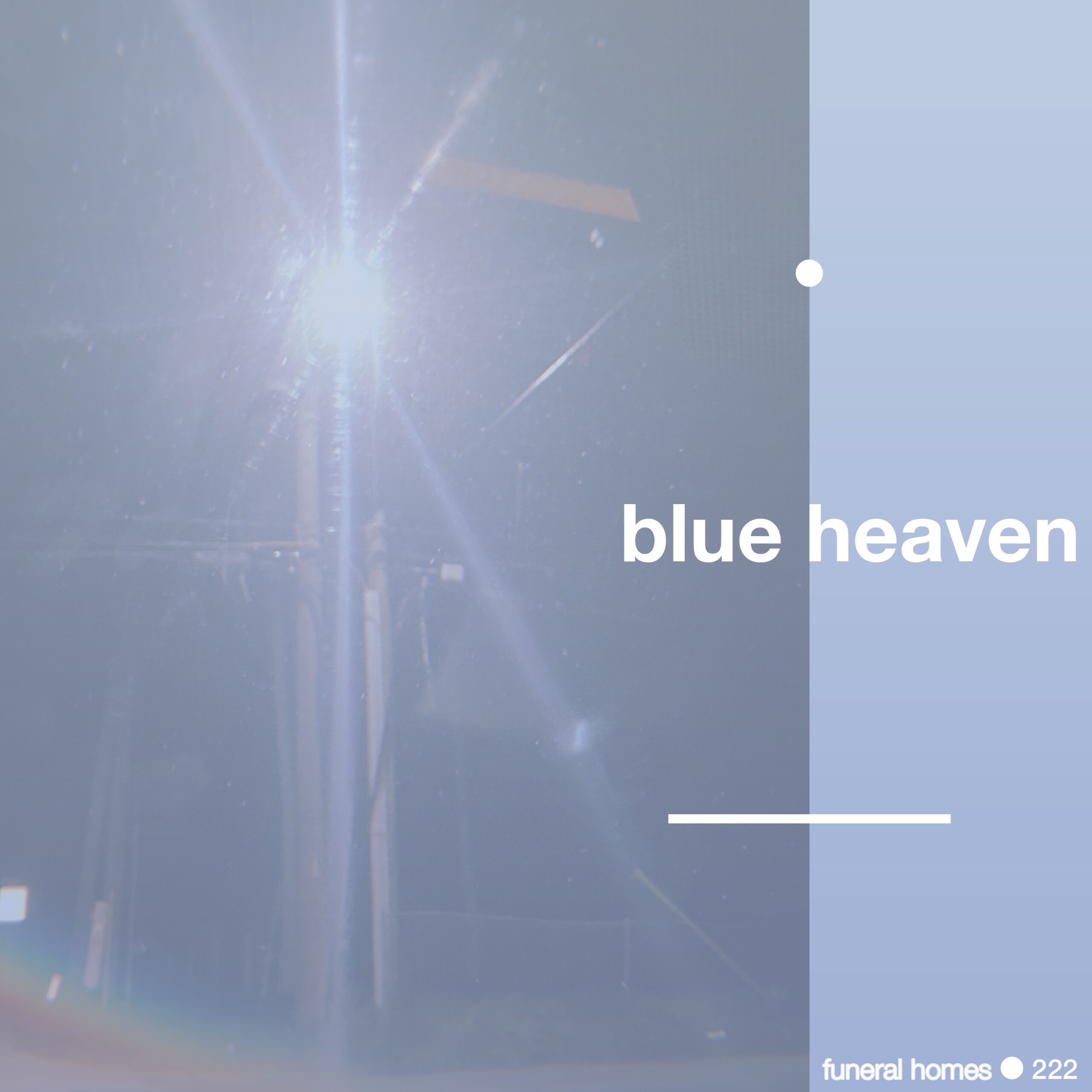I was telling my partner recently about the proliferation of “biblically accurate angel” memes that compare the anodyne depiction of angels in commercial art with the incomprehensible beings that the Bible actually describes. It’s easy to project an image of sanctified goodness backwards, to recreate history in a way that feels comforting and bland. But the biblically accurate angel appeals to me because it feels like a more accurate representation of what encountering divinity might actually look like: terrifying and glorious in equal measure. Your senses overload, your brain short-circuits; you can only describe what you experienced in retrospect, and even then, you can’t get words around every part of the experience.
Midway through Blue Heaven, Sofia Poppert’s second album as Funeral Homes, she builds a monument to an experience like that. “Close Encounter” is percussionless and nearly structureless, laying on a bedrock of searing, distorted guitars that build and crash over themselves like waves. Poppert accompanies this roaring texture with the sampled voice of a British woman, recounting a UFO sighting in her front yard. She recalls a strange sensation, being both “paralyzed with fear” and overcome with wonder at the beauty and power of the sight. Then, she looks away, and the UFO disappears; the guitars recede, but their last notes still ring out.
This close encounter ripples through Blue Heaven’s soaring, skybound shoegaze. While no other track on the record is as explicit in its meaning, the album’s sound literalizes the push-and-pull between wonder and terror. Funeral Homes’ past work has flirted with shoegaze; the guitar tones on songs like “Anything,” from 2019’s Lavender House, achieved a similar sense of textural bliss, but one filtered through low-fi emo and bedroom pop. By contrast, Blue Heaven is widescreen and unambiguous. Poppert’s voice is usually mixed low, reducing her words to ethereal wisps of melody. Above her are torrential currents of chiming, ringing, raging guitar; below her, drums hit like thunderclaps, giving the songs body and weight.
The resultant songs feel incredibly physical, with a foot in mosh-ready hardcore punk. It’s easy to trance out to a song like “Before You Leave,” with its gauzy harmonies and pealing deconstructed chords; it’s just as easy to headbang to the devil-horn riffs and gunshot snares on lead single “Double Vision.” This duality between warmth and momentum makes Blue Heaven feel simultaneously awestruck and titanic, as if mesmerized by its own power.
This duality is best demonstrated on “Fairy Ring,” one of the album’s highlights. The song’s opening snares are sharp and hard, charged with energy even before the walls of guitar crash in. It’s one of the album’s most relentless songs, and the forward energy only halts when the guitars skid into an unexpected minor chord and get stuck on it. The first time this happens, the song simply resets; the second time, Poppert suddenly gear-shifts, lowering the tempo and introducing a skeletal restatement of the major chords that opened the song. By the time the drums barrel back in, the mood has completely changed from racing, nervous energy to an overwhelmed calm, like the song has shifted into the eye of a hurricane or the blessed center of a spiritual place.
Blue Heaven is preoccupied with spiritual and mythical images – aside from “Fairy Ring” and “Close Encounter,” there’s the jangling “Serraphim Sight” and the placid closer “Capricorne Skies.” Even songs that don’t directly reference the divine feel reverent; “Starlit,” a re-recording of an earlier song titled “By My Side,” is a love song built on a bed of welcoming, glowing guitars and a glimmering synth line. Instead of a chorus, the song circles around an ascending chord progression that skips a step before resolving, like it’s taking a leap of faith. Its repetition becomes strangely reassuring, a reminder that even an oceanic experience like falling in love can be peaceful and safe – or the other way around.
The album’s ideas fully come together on “777,” appropriately its seventh track. It features the record’s gnarliest riffs, with a lithe guitar line soaring over a crunchy, bottom-heavy groove; it feels like a lost classic rock anthem passed through another dimension. Like “Starlit,” it’s a re-recording of an earlier song, one that cranks every instrument louder and clearer until all of its textures are bright and blinding.
Atop this blazing backdrop, Poppert sings of being lost and being found; “I can fall apart/…But I can change my heart,” she concludes. The song’s neon white tone and skyscraping physicality are both invigorating and a little intimidating, emphasizing both the terror of loneliness and the warm joy of recognition. But the song’s central image – a “7-inch halo,” a “7-inch heart” – puzzled me at first, until I remembered that 7 inches is the diameter of a vinyl single.
Shoegaze is one of the most purely textural kinds of rock; even in its heyday, it was often stereotyped as aimless, solipsistic guitar fuckery without much to say. But in its pursuit of aesthetic rapture above all else, shoegaze can also embody a rare sense of purity, finding release in the existence of music itself. Blue Heaven is a love letter to the way the genre communicates bliss and terror and melancholic joy. It’s a love letter to the wonderful, horrible experience of being alive.
Blue Heaven was released today, 11/11, via Lonely Ghost Records. You can follow Funeral Homes over on Twitter and Instagram, and be sure to support the new album over on bandcamp or listen wherever you prefer to stream your music.

